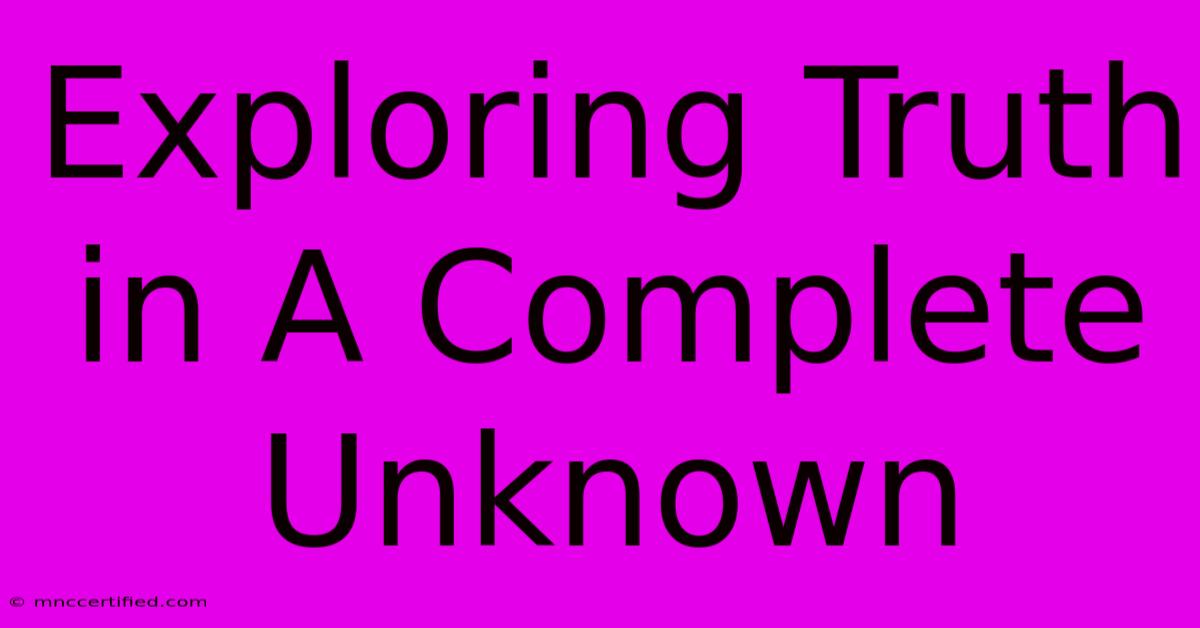Exploring Truth In A Complete Unknown

Table of Contents
Exploring Truth in a Complete Unknown: Navigating Uncertainty and Finding Meaning
The human experience is fundamentally intertwined with the pursuit of truth. Yet, the very nature of truth often remains elusive, particularly when we venture into the realm of the completely unknown. This article explores the challenges and paradoxes inherent in seeking truth in uncharted territories, examining various philosophical perspectives and practical approaches to navigating uncertainty and finding meaning within the unknown.
The Paradox of the Unknown
The unknown, by its very definition, lacks established frameworks or readily available answers. This presents a paradox: how can we seek truth in a space where truth itself is undefined? We are simultaneously drawn to explore these mysteries and burdened by the inherent limitations of our understanding. This inherent tension fuels both our curiosity and our anxieties.
Key Challenges:
- Defining "Truth": Before embarking on a search for truth in the unknown, we must confront the multifaceted nature of truth itself. Is it objective and absolute, or subjective and relative? This fundamental question significantly impacts our approach to exploration.
- Bias and Preconceptions: Our existing knowledge, beliefs, and cultural conditioning inevitably shape our perception of the unknown. These biases can subtly (or not so subtly) distort our interpretation of evidence, leading us to construct narratives that confirm pre-existing beliefs rather than objectively reflect reality.
- The Limits of Perception: Our sensory and cognitive capacities are inherently limited. We may perceive only fragments of the complete picture, leaving vast gaps in our understanding. This makes it challenging to form a complete and accurate picture of the unknown.
- The Problem of Verification: In the absence of established facts and accepted methods of verification, how do we determine what constitutes valid evidence? This lack of verifiable information makes the search for truth in the unknown particularly difficult.
Philosophical Perspectives
Different philosophical viewpoints offer diverse approaches to grappling with the unknown:
- Empiricism: This approach emphasizes the role of observation and experience in acquiring knowledge. When exploring the unknown, an empiricist would prioritize rigorous data collection and experimentation to build a factual foundation.
- Rationalism: Rationalists prioritize reason and logic as primary sources of knowledge. They might employ deductive reasoning or build theoretical models to understand the unknown, focusing on internal consistency and logical coherence.
- Skepticism: A skeptical approach acknowledges the inherent limitations of our knowledge and encourages critical examination of claims and evidence. Skeptics would prioritize rigorous scrutiny and avoid premature conclusions.
- Existentialism: This perspective emphasizes the individual's freedom and responsibility in creating meaning and value in a seemingly meaningless universe. Encountering the unknown might be viewed as an opportunity for self-discovery and the forging of personal meaning.
Practical Approaches to Navigating Uncertainty
Despite the inherent challenges, several practical strategies can enhance our ability to navigate the unknown and seek truth:
- Embrace Curiosity: Cultivate a genuine thirst for knowledge and a willingness to explore unfamiliar territories.
- Develop Critical Thinking Skills: Hone your ability to evaluate evidence, identify biases, and construct logical arguments.
- Collaborate and Share Knowledge: Engage in discussions and collaborations with others to broaden your perspectives and gain access to diverse viewpoints.
- Embrace Fallibility: Acknowledge that your understanding is incomplete and that you may be wrong. This humility is crucial for continued learning and growth.
- Focus on the Process: The journey of exploration itself can be profoundly enriching, even if definitive answers remain elusive. Focusing on the process of inquiry can provide a sense of purpose and accomplishment.
Conclusion: The Ongoing Quest
Exploring truth in the complete unknown is a challenging but ultimately rewarding endeavor. By acknowledging the inherent complexities, adopting rigorous methodologies, and embracing a spirit of curiosity and humility, we can make meaningful progress in understanding the world around us and finding our place within it. The quest for truth is not about arriving at definitive answers, but about engaging in a continuous process of learning, discovery, and self-reflection. This continuous exploration, in itself, defines the nature of our search for meaning in a world rife with unknowns.

Thank you for visiting our website wich cover about Exploring Truth In A Complete Unknown. We hope the information provided has been useful to you. Feel free to contact us if you have any questions or need further assistance. See you next time and dont miss to bookmark.
Featured Posts
-
Knicks Defeat Spurs On Christmas
Dec 26, 2024
-
Nfl Christmas Netflixs Performance
Dec 26, 2024
-
Watch Ravens Vs Texans Week 17 Online
Dec 26, 2024
-
Beyonce Halftime Show Live Stream Guide
Dec 26, 2024
-
Aus Vs Ind Day 1 Top Order Collapse
Dec 26, 2024